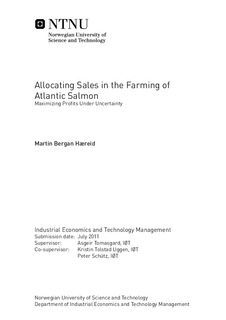Allocating Sales in the Farming of Atlantic Salmon: Maximizing Profits Under Uncertainty
Abstract
Salmon farmers face an uncertain production environment and considerable price volatility, making planning a vital success criteria. This thesis describes the sources of uncertainty that are most important when planning sales, and demonstrates how this uncertainty can be taken into consideration by the use of stochastic programming.The basis for this thesis is the tactical planning problem of deciding when to harvest salmon and how to allocate sales between available contracts and sales in the spot market. Uncertainty relevant to the planning problem is described, and a multistage stochastic model that maximizes profit is proposed. The goal of the model is to provide salmon producers with a tool that can aid them in making profitable decisions regarding harvesting and future sales, by taking into account the uncertainty associated with biomass and price development.The model is implemented in three versions; a deterministic model, a two-stage stochastic model, and a multistage stochastic model. The implemented models are somewhat simplified, the most important simplification being that price is assumed deterministic in the stochastic models. This is done in order to make the stochastic models computationally tractable for a personal computer. All three models are written in Mosel, implemented in Xpress-IVE, and solved by the Xpress Optimizer.The implemented models are applied to Marine Harvest Region Mid, illustrating how the models can be used to solve a realistic salmon sales planning problem. In addition, a quantitative assessment of the gains from implementing a stochastic solution is demonstrated. The results obtained show that using the two-stage stochastic model provides almost no additional value over the deterministic model. For the multistage stochastic model, this value is substantially higher, though still marginal, largely due to the simplifications made in the implementation. Based on the simplifications made in the implemented models, possible extensions to the thesis are suggested.
